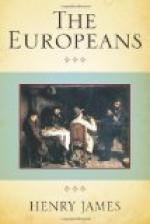Eugenia herself, as we know, had plenty of leisure to enumerate her uses. As I have had the honor of intimating, she had come four thousand miles to seek her fortune; and it is not to be supposed that after this great effort she could neglect any apparent aid to advancement. It is my misfortune that in attempting to describe in a short compass the deportment of this remarkable woman I am obliged to express things rather brutally. I feel this to be the case, for instance, when I say that she had primarily detected such an aid to advancement in the person of Robert Acton, but that she had afterwards remembered that a prudent archer has always a second bowstring. Eugenia was a woman of finely-mingled motive, and her intentions were never sensibly gross. She had a sort of aesthetic ideal for Clifford which seemed to her a disinterested reason for taking him in hand. It was very well for a fresh-colored young gentleman to be ingenuous; but Clifford, really, was crude. With such a pretty face he ought to have prettier manners. She would teach him that, with a beautiful name, the expectation of a large property, and, as they said in Europe, a social position, an only son should know how to carry himself.
Once Clifford had begun to come and see her by himself and for himself, he came very often. He hardly knew why he should come; he saw her almost every evening at his father’s house; he had nothing particular to say to her. She was not a young girl, and fellows of his age called only upon young girls. He exaggerated her age; she seemed to him an old woman; it was happy that the Baroness, with all her intelligence, was incapable of guessing this. But gradually it struck Clifford that visiting old women might be, if not a natural, at least, as they say of some articles of diet, an acquired taste. The Baroness was certainly a very amusing old woman; she talked to him as no lady—and indeed no gentleman—had ever talked to him before.




